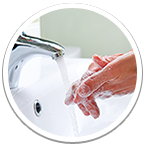Prevention of infectious diseases among migrants
All migrants have the right to necessary healthcare services in Finland, and the assessment of which services are considered necessary is made by a healthcare professional. Anyone in need of emergency medical care is treated urgently, for example in case of an acute infection.
In Finland, asylum seeking adults are entitled to necessary healthcare services, whereas asylum seeking children and people who have been granted an asylum have access to same healthcare services as the nationals.
Some migrants, especially asylum seeking children, are particularly susceptible for infectious diseases eg. due to deficient immunisation. The risk of infectious diseases also depends on the country of origin, and the countries and conditions in which the migrants have stayed on their way to Finland.
This page contains information on healthcare services and prevention of infectious diseases, which are provided for people who have migrated to Finland.
Page content
The initial health examination
People who have migrated to Finland are offered an opportunity for an initial health examination. Normally the examination takes place within two weeks of arrival to Finland or submission of the asylum application.
The issues covered in the initial health examination are:
- where the person has resided before migrating to Finland, including the country of origin and stay in conflict zone or refugee camp
- current symptoms
- previous vaccinations
- previous diseases and treatments
- possible exposure to infectious diseases
- current medication.
Referral to a physician
If the person who has migrated to Finland has an acute medical condition, she or he is urgently referred to emergency department or within a week of the initial health examination to a physician.
Children under 7 years of age and persons with disabilities are referred to a physician within one month of arrival. Pregnant women are offered monitoring at a maternity clinic and at least one appointment with a clinic physician before the due date.
Screening of infectious diseases
If the person who has migrated to Finland has symptoms of tuberculosis, he or she is urgently referred to a chest x-ray examination. If tuberculosis is diagnosed, the treatment is started.
For an asymptomatic person a chest x-ray is performed if she or he comes from a country with high incidence of tuberculosis or high prevalence of multidrug resistant tuberculosis, has resided in a refugee camp or conflict zone, or is at elevated risk of tuberculosis for other reasons.
If there is a risk of spread of a generally hazardous communicable disease, the authorities will take the necessary means, such as ordering a quarantine or isolation and tracing the contacts. Generally hazardous communicable diseases include e.g. tuberculosis, polio, measles and diphtheria.
When necessary, laboratory tests are taken to screen tuberculosis, HIV, hepatitis B, hepatitis C, syphilis and intestinal parasites. People who have migrated to Finland and whose chest x-ray or laboratory tests show abnormalities are referred to a physician.
Vaccinations offered for migrants
Some of the people who have migrated to Finland come from areas where it has not been possible to implement comprehensive vaccination programs in recent years. The need for vaccination of people who have migrated to Finland is assessed in connection with the initial health examination. If necessary, the immunisation is completed.
Children are vaccinated according to national vaccination program and adults when it is considered necessary for the protection of individuals and population. The vaccines for risk groups are offered for those children and adults, who belong to risk groups.




